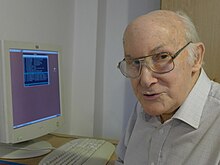Wojtek Krzemiński
| Wojciech Krzemiński | |
|---|---|
 |
|
| Born |
May 20, 1933 Warsaw, Poland |
| Died | August 5, 2017 (aged 84) |
| Nationality | Polish |
| Alma mater | University of Warsaw |
| Scientific career | |
| Fields | astrophysics |
| Institutions |
NCAC in Warsaw and the Carnegie Institution Observatories |
| Patrons | Polish Academy of Sciences |
Wojciech Krzemiński (20 May 1933 – 5 August 2017) was a Polish astronomer and a retired professor of Nicolaus Copernicus Astronomical Center of Polish Academy of Sciences. He worked many years for the Carnegie Institution for Science Observatories.
Wojciech Krzemiński was a student of professors Stefan Piotrowski and Vladimir Zonn. In the early 1960s he was active in Lick Observatory and Lowell Observatory in USA, and at the end of the 1960s he received a scholarship at Carnegie Institution. In 1973, he left – as the first Polish astronomer – to Las Campanas Observatory in Chile. In the 1970s Krzemiński actively collaborated with professors Bohdan Paczyński and Józej Smak. In the 1980s he received an offer to take over as administrator or "resident astronomer" of Las Campanas, position which he held for 16 years. He lived many years in La Serena in Chile and returned to Poland in 2011.
Wojciech Krzemiński was one of the first observers, who in the 1960s demonstrated the dual nature of cataclysmic variables. Together with Joseph Taste suggested that these objects are in process of accretion of matter and correctly interpret their light curve change as coming from the accretion disk impacted through a narrow stream of matter flowing through the inner Lagrange point of less massive component of binary star system.
Also in the 1960s, he performed accurate measurements of the brightness of dwarf novae like U Geminorum, discovered Dec. 4, 1961. The marked eclipse of U Geminorum repeated with a period of 4 hours 14 minutes and 45 seconds for the first time clearly demonstrating that we are dealing with a double system.
...
Wikipedia
